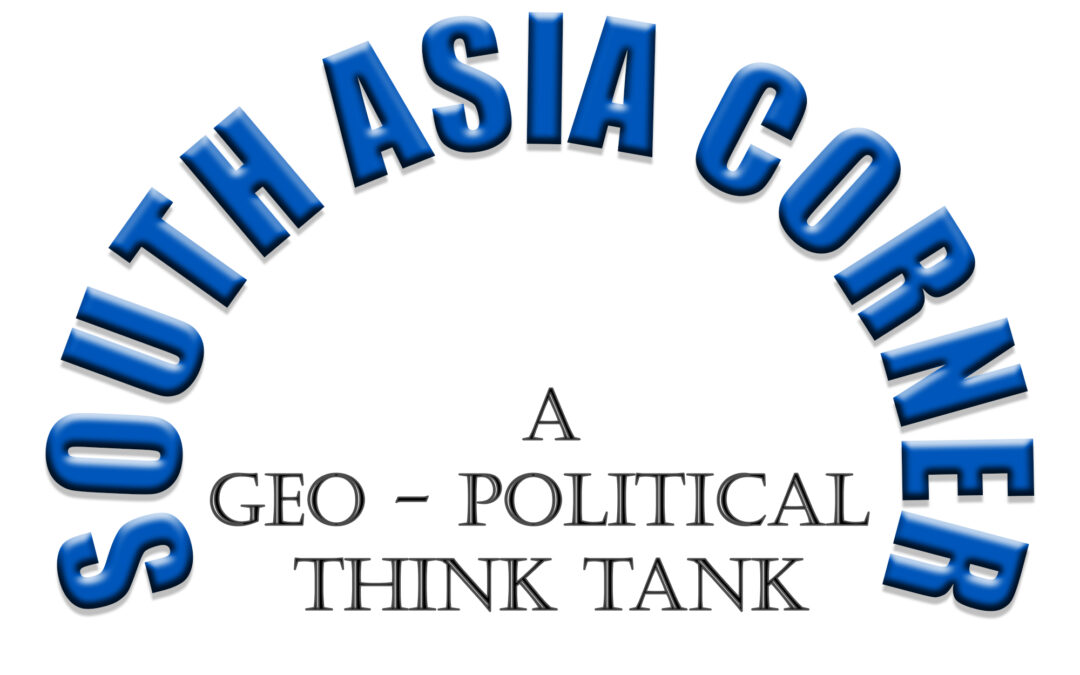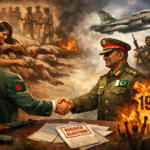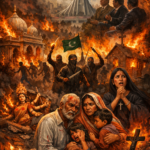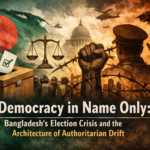
Introduction:
Pakistan’s interim caretaker prime minister, Anwaar-ul-Haq Kakar, became visibly upset during a press conference in Islamabad when questioned about the Baloch protesters in the capital. These demonstrators were urging government intervention in cases of enforced disappearances and extrajudicial killings. Kakar labelled them as “relatives of those fighting against the state” and their supporters as “advocates of terrorists in Balochistan.” His outburst aimed to delegitimize the Baloch protestors and justify the police violence against them.
The caretaker prime minister’s response underscores the persistent issue in the government’s approach to the Baloch people. Over the years, both civilian and military leaders in Pakistan have framed the Baloch problem as a security issue rather than addressing the community’s grievances and demands.
This approach has resulted in widespread violations of the human, political, and economic rights of the Baloch people, escalating conflict in the region. To prevent the crisis from deepening further, it is crucial for the Pakistani government to change its strategy.
Facts and figures:
Balochistan, constituting 43.6% of Pakistan’s total area, is the country’s largest province. Despite its wealth in natural resources like gold, copper, oil, and natural gas, and the strategic Gwadar Port on its coastline, it remains the poorest province. The Baloch, comprising a third of the population, have faced marginalization due to discriminatory government policies, fueling prolonged armed resistance.
The conflict, which started in the 2000s with demands for a fair share of resources, has evolved into calls for independence. However, not all Baloch people support armed groups; many believe a political solution is achievable if Islamabad addresses their grievances.
Regrettably, successive governments have responded with force, branding even non-violent Baloch activists as “terrorists.” This approach has hindered meaningful engagement with Baloch society, preventing a peaceful resolution. The government’s security-focused strategy has led to a human rights crisis, particularly in enforced disappearances, causing tension and protests.
Reports suggest over 5,000 enforced disappearances, with the government acknowledging 2,700 cases. Human rights violations are widespread, even acknowledged by Pakistani institutions. The Balochistan’s Struggle for Hope report by the Human Rights Commission of Pakistan (HRCP) in 2023 highlighted the rise in enforced disappearances in the province.
Young people, especially students, are frequent targets, with reports even mentioning the enforced disappearance of minors. The growing distrust between Baloch communities and authorities, combined with the violent suppression of peaceful protests, exacerbates the crisis.
In November, a Baloch man forcefully disappeared from Turbat and was killed in Islamabad. The government labelled him a “terrorist,” while relatives claimed extrajudicial killing. Protests and a march from Turbat to Islamabad demanding an end to extrajudicial killings were met with police action, further fueling Baloch’s anger.
Soul Searching:
To address the Baloch issue, the Pakistani political elite must acknowledge the community’s valid grievances and refrain from attacking those seeking peaceful resolutions. Steps should include assessing and understanding the conflict’s root causes, engaging moderate Baloch factions within the legal framework, investigating enforced disappearances, and holding perpetrators accountable.
Grim Chances: Efforts to build trust with the Baloch community can pave the way for negotiations on the equal distribution of profits from Balochistan’s resources. Political stability in Balochistan is crucial for Pakistan’s economic development, benefiting projects like the China-Pakistan Economic Corridor and attracting foreign investment. The missing element in this equation is the political will in Islamabad.
DNA of Pakistan, Amry:
The echoes of Pakistan’s troubled history reverberate in the present-day atrocities and oppression faced by the people of Baluchistan, drawing unsettling parallels with the army’s behaviour during the 1971 genocide in East Pakistan, now Bangladesh. The Pakistan Army’s actions in East Pakistan were marked by widespread human rights abuses, leading to one of the most devastating humanitarian crises in history. Fast forward to the present, and the patterns of violence and disregard for the rights of its own citizens seem distressingly ingrained in the DNA of the Pakistan Army.
Parallels: The grim resonance between the historical genocide and the ongoing plight of the Baloch people underscores a disturbing consistency in the military’s approach. The Balochistan crisis not only mirrors the horrors of the past but also highlights a persistent lack of accountability and a concerning propensity for using force to suppress dissent. This historical context raises serious questions about the government’s commitment to addressing the legitimate grievances of the Baloch community, as well as its willingness to break free from a troubling legacy of oppression.
Conclusion:
As the Baloch people endure enforced disappearances, extrajudicial killings, and systemic human rights violations, it becomes imperative for Pakistan to confront its past and forge a new path that prioritizes dialogue, justice, and respect for the fundamental rights of its citizens. The international community, too. The world must scrutinize these parallels, urging Pakistan to break free from a pattern that has caused immense suffering and threatens to perpetuate a cycle of violence and repression in Baluchistan.







